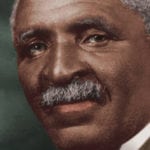Polysyndeton Employing many conjunctions between clauses, often slowing the tempo or rhythm.
Asyndeton The opposite of polysyndeton – the omission of conjunctions between clauses – employed in a very famous quote: Brachylogia is similar to this though it omits conjunctions between single words to give a hurried feel: “John! Rise, eat, leave!”
Hysyteron Protoron I love this one because you can have a lot of fun with it. This is the reversal of words based upon the order of time. This is something we all use often – the best example being: “Put on your shoes and socks” – obviously you must put your socks on first. This is a type of hyperbaton which is simply a reversal of word order without relation to time: “Why should their liberty than ours be more?” Shakespeare.
Homoioteleuton Similarity of endings of adjacent or parallel words.
Zeugma A general term describing when one part of speech (most often the main verb, but sometimes a noun) governs two or more other parts of a sentence (often in a series).
Metonymy Reference to something or someone by naming one of its attributes. For example, “He bought a great set of wheels” – wheels being the attribute of the actual object he bought: a car. Another example: “We await word from the crown.” The crown is an attribute of the King, and in this context is a reference to the King himself, not the crown he wears.
Litotes Deliberate understatement, especially when expressing a thought by denying its opposite. This is a form of modesty often used to gain favor with one’s audience:
Anaphora Repetition of the same word or group of words at the beginning of successive clauses, sentences, or lines. I am certain you will have heard the greatest modern example of this one: Sir Winston was famed for his great speeches – but what few know is that he would pore over them making great use of rhetoric, and then memorize them. He managed to perform his speeches as if he were speaking from the top of his head. He is recognized as one of the greatest statesmen – and rhetoric is one of the reasons why.
Diaskeue Something the press should use less often! This is the graphic peristasis (description of circumstances) intended to arouse the emotions.
Paralipsis This is a wonderful rhetorical trope – it is stating and drawing attention to something in the very act of pretending to pass it over. A kind of irony. I now challenge you to use at least one of these tropes in the comments below (in your own words, not quoted from a famous speech). Sources: Silva Rhetoricae
Technorati Tags: rhetoric
Read More: Twitter Facebook YouTube Instagram












